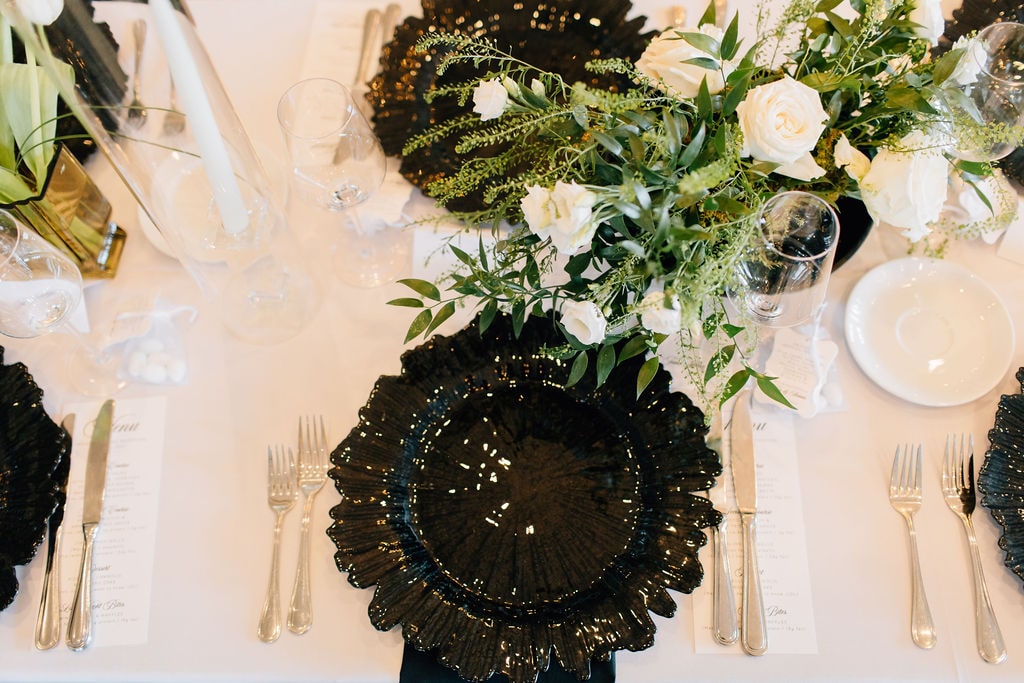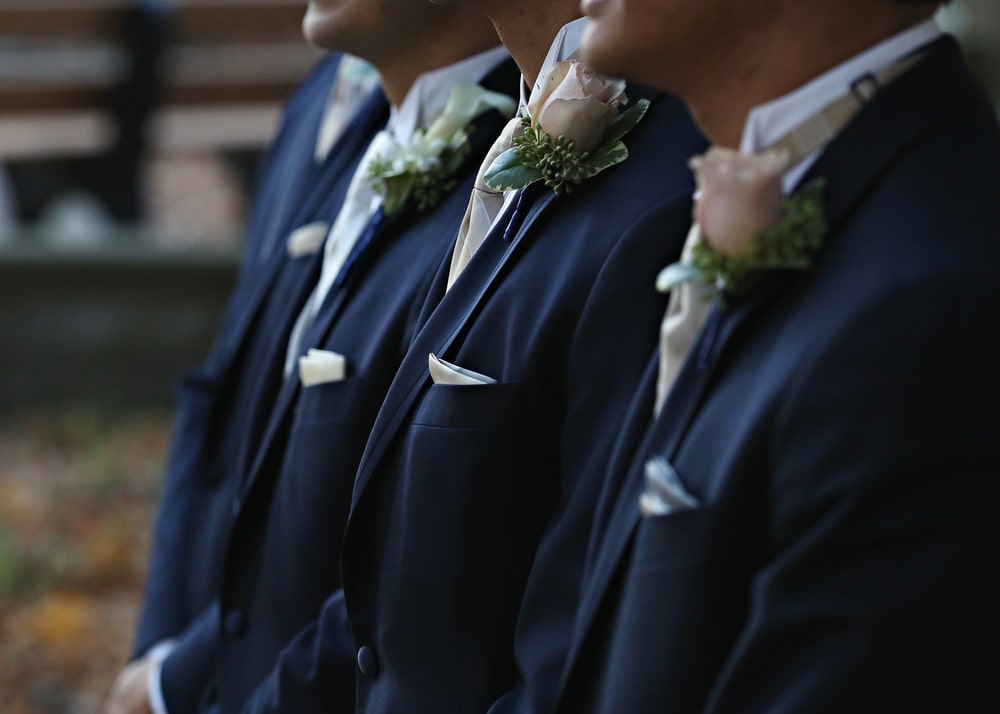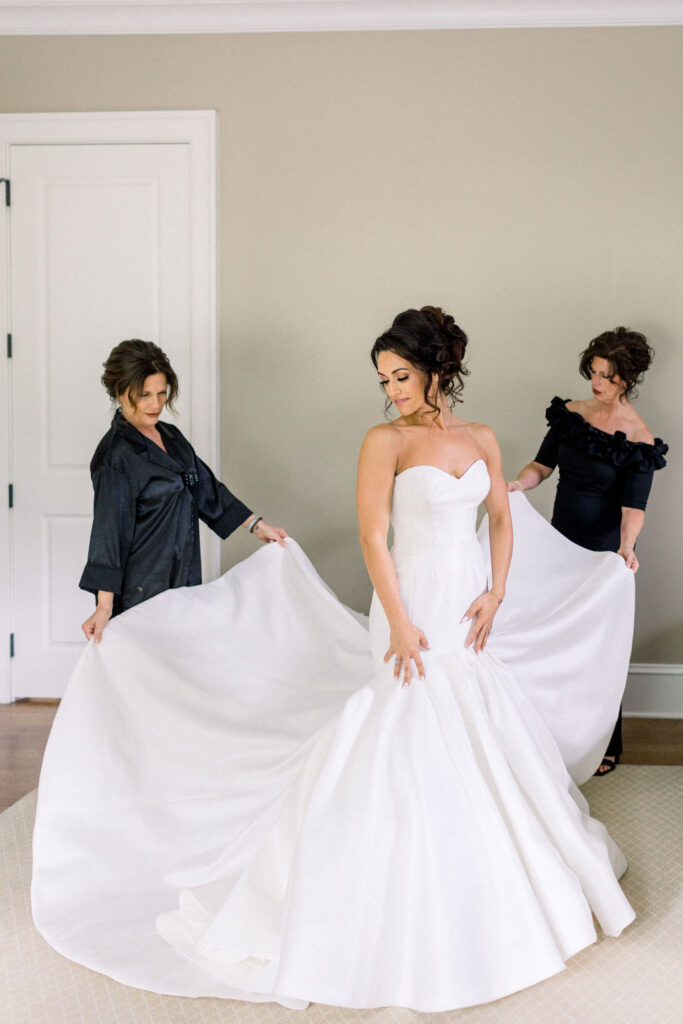It’s no secret that weddings are an expensive affair. It all adds up, from the dress and decorations to the food, venue, and entertainment. These costs go up considerably when throwing a luxury shindig. All of this begs the question; who pays for the wedding? The answer is not cut and dry, as there are many factors to consider, such as culture, budget, family dynamics, etc.
In this guide, we’ll look closer into the different aspects that come together to make up who pays for what at a wedding.
- Who Traditionally Pays for What?
- How To Divide The Costs
- Contact Curated Events For Budgeting Help
“Note: Modern weddings are relying less and less on traditional gender roles, so take the below information with a grain of salt. Budgeting and spending decisions should be made between couples and their families on a case-by-case basis.”
Who Traditionally Pays For A Luxury Wedding?

The traditional wedding saw the bride’s parents “give away” their daughter. As such, the bride’s family was expected to foot a larger portion of the bill. In fact, they paid for the majority of the wedding costs, such as:
- Venue
- Food
- Stationery
- Wedding dress and accessories
- Music/Entertainment
- Flowers
- Photography/Videography
Nowadays, couples are taking a different approach. We are seeing various payment arrangement trends befitting of modern times, such as:
Two-way Split
In this scenario, the bride’s and groom’s families split the wedding costs evenly. A two-way split is an excellent option for those wanting to give their parents a say in how they would like the big day to be while still covering most of the costs.
“This method ensures that both families are invested in the wedding and takes some burden off each side. It also allows both parties to contribute their traditions and preferences, which is great for couples with blended backgrounds.”
The groom’s side might pay for the marriage license, officiant fees, bar and rehearsal dinner. They will also cover everything pertaining to the groom, such as the groom’s attire, and boutonnieres.
If the wedding requires lodging for the groom’s side of the family, they will also be responsible for those costs. Finally, the honeymoon costs are split evenly between families.

The bride’s side will cover the decorations, such as flowers, chairs, and linens. They will also pay for the bridal gown and accessories, bridesmaids’ gifts, wedding cake, and any additional services the couple might need. Music, photography, and videography costs will depend on the budget and what both parties are comfortable with. Sometimes, a connection on either side of the family can get these services at a discounted price.

Three-way Split
The couples pitch in on the cost of this arrangement, taking a bit of the burden off their families. It’s a great option for couples who want to pay for most of their wedding but don’t have the means. After all, these days, couples typically pay for their own expenses, like homes and cars.
The couple typically covers around 40-50% of the cost in this scenario. They might choose a venue, photographer/videographer, and music/entertainment, while the bride’s family pays for the rehearsal dinner, dress, and accessories. The groom’s family will then pay for the officiant fees, marriage license, groomsmen attire, and bachelor party expenses.
“The three-way split does require some level of collaboration and communication between all involved parties. Instead of the couple making decisions and sending a bill, the in-laws should be included in all conversations so that everyone feels comfortable and respected.”
Guest Contributions
Gifting is a time-honored tradition in many cultural weddings. It’s a way to lend a helping hand to couples who are just beginning their communal lives. That’s because, traditionally, couples did not live together before marriage and were expected to start their lives from scratch. These days, couples are more likely to have some household items already, rendering many traditional gifts useless.
Instead of asking for household items they may already own, couples now ask for contributions to their wedding funds, honeymoon trips, or even starting a college fund for future children. The rise of registries and crowdfunding platforms have popularized this trend. However, it is still a touchy subject, so couples should proceed tactfully and respectfully when asking for monetary gifts.
These contributions should be voluntary and not expected of any guest. The couple should express gratitude for anything given, as not every guest can contribute the same amount.”
How To Divide The Costs
Since the most common way of paying for weddings combines the aforementioned methods, it’s essential to figure out how to divide the costs between all parties. The following section will provide tips on how to do this in an equitable and respectful manner.
Prioritize
First and foremost, couples should decide what they prioritize and allocate their budget accordingly. To know who is paying for what, we must first determine how much money is available to work with. Many families create a wedding fund, a collective pot of money to which all parties contribute.
The items that need to be covered should be divided into two categories: must-haves and nice-to-haves. The “must” items are the ones that are absolutely essential to the wedding day going according to plan, while the “nice” items are more of a bonus. And while every wedding is unique, there are some basics that all couples should consider.
- Ceremony – You must pay for the venue, officiant, and other related expenses.
- Reception – The couple must account for the location, caterer, music/entertainment, photography/videography, and other items.
- Wedding Attire – This typically falls on the bride and groom, though it can be split if needed. A beautiful dress and suit will cost a lot of money, so couples should factor this into their budget.
- Flowers and Decorations – A good florist and a creative decorator can be pricey but will also make your wedding look stunning.
- Honeymoon – Some couples travel extensively for their wedding, including a honeymoon. If that is more important to you than a lavish reception, allocate your budget accordingly.
- Pre-wedding Celebrations – include rehearsal dinners, engagement parties, and bridal showers. These are typically not essential to the wedding day itself, but they can be great occasions for friends and family to come together.
- Rings – The groom usually pays for the engagement ring and wedding band out of his own pocket, though some couples split the costs.
- Stationery – Save-the-date cards, invitations, and thank-you cards are important for any wedding. The couple should decide how much to spend on it before committing to stationery.
- Transportation – Will you need to rent a car, shuttle service, or limousine for the wedding day?
- Food and drinks – Wedding cakes, open bars, and other catering services will be costly. Even if the reception is held in a restaurant or venue providing these items, the couple should factor in any additional costs.
- Miscellaneous Costs – There may be other unavoidable expenses, such as gifts for attendants and wedding favors. Couples should plan ahead and allocate a specific amount of their budget to cover these items.
Once you’ve listed all the expenses, you should know how to divide them among all parties. You can split everything equally or assign portions to specific people – it’s up to the couple and their families.
Communicate
When outsourcing tasks to other people, communication must be constant. In some families, the contributors simply write a check and let the couple handle everything. In others, they may play a more active role in the planning process. Either way, couples should keep everyone in the loop and ensure everyone is on the same page about who pays for what. Doing so will help to avoid any confusion or miscommunication down the road.
For example, if your parents offered to hire a photographer, you should be consulted before making a final decision. That way, everyone will know what to expect, and there won’t be any surprises. Additionally, couples should stay in touch with all of their vendors so that they can address issues as they arise.
Stay On Budget
Paying for someone else’s wedding is already a generous gesture. Take your time with it. Stick to the budget you’ve outlined, and don’t splurge on unnecessary items. Otherwise, you may be in financial trouble or have to ask for more money from your contributors. Your families should only pay what they are comfortable with, and you should respect their wishes.
“Writing up a budget and sticking to it is the best way to track all your expenses. It lets you plan and avoid any last-minute scrambling or unanticipated costs.”
Contact Curated Events For Budgeting Help
As a premier wedding rental and event planning company, Curated Events can help you maximize your budget. We’ll walk you through our inventory of luxury wedding items, provide personalized consultations, and help you maximize your budget. That way, you’ll clearly know how much you need to spend on the wedding and who should contribute.
We understand that weddings are expensive and can be overwhelming. We want to ensure everything goes as smoothly as possible, so you can enjoy your special day without worrying about money! Contact us today for more information.

